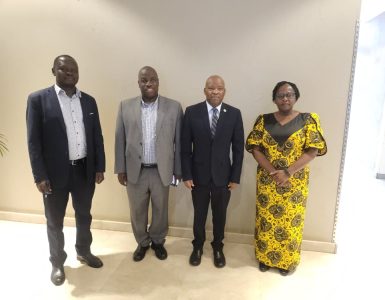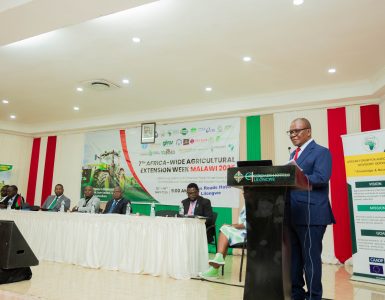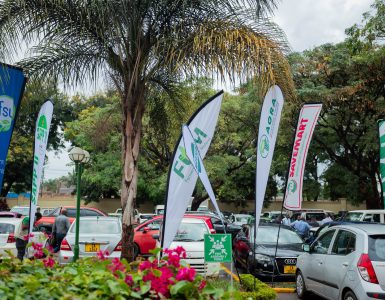Infrastructure development presents a significant opportunity for creating and absorbing the demand for labor and through direct implementation. Its spillover effects within the wider economy can serve as a game-changing catalyst for cross–sectoral job creation in Africa. Recognizing the potential of regional infrastructure development as a key to leverage jobs creation, the African Union Commission and the African Union Development Agency–NEPAD finalized the development of a tool to estimate, integrate and promote job creation through infrastructure development under the framework of the Programme for Infrastructure Development in Africa (PIDA). The tool is called the PIDA Job Creation Toolkit.
The AUDA–NEPAD has been providing support to the Zambezi River Authority on the use of its tools for Job Maximisation and Domestic Financial Resource Maximisation for the Batoka Gorge Hydro–Electric Scheme, a priority project under PIDA. The Batoka Gorge Hydro–Electric Scheme was used as a pilot project to estimate the number of direct, indirect, induced and secondary jobs to be created during its cycle, using the PIDA Job Creation Estimation toolkit. Estimates show that the project has the potential to creation 10 443 jobs during construction (i.e. 4262 direct, 20176 indirect and 4105 induced jobs). Opportunities for maximising jobs were identified in the cement, steel, transport and tourism industries and these can potentially result in an additional 11258 jobs.
The AUDA–NEPAD has been providing support to the Zambezi River Authority on the use of its tools for Job Maximisation and Domestic Financial Resource Maximisation for the Batoka Gorge Hydro–Electric Scheme, a priority project under PIDA. The Batoka Gorge Hydro–Electric Scheme was used as a pilot project to estimate the number of direct, indirect, induced and secondary jobs to be created during its cycle, using the PIDA Job Creation Estimation toolkit. Estimates show that the project has the potential to creation 10 443 jobs during construction (i.e. 4262 direct, 20176 indirect and 4105 induced jobs). Opportunities for maximising jobs were identified in the cement, steel, transport and tourism industries and these can potentially result in an additional 11258 jobs.
A second pilot study was also conducted to examine the potential application of the 5% Agenda and the Africa infrastructure Guarantee Mechanism to mobilise domestic financial resource for the project. Both Zambia and Zimbabwe have established Pension and Insurance Funds with assets under management equivalent to US$1.8 billion and US$7.4 billion mostly held in long–term assets. Diaspora remittances through official channels into the two countries amount to US$1.9billion/year and these can be
mobilised for development under the right conditions.
The two institutions organised a joint meeting between 28 and 30 May 2019 in Lusaka, Zambia, with stakeholders to deliberate on concrete actions to maximise the job creation potential and domestic financial resource mobilisation for the Batoka Gorge Hydro–Electric Scheme.
“Tools that will allow maximisation of jobs from the Batoka Gorge Hydro–Electric Scheme, both directly and indirectly, will see real impact for the benefit our people,” stated Mr Edward Kabwe, representing the CEO of the Zambezi River Authority, Eng. Munyaradzi Munodafawa.
“Today marks a very important milestone in the history of PIDA, for the first time we are showcasing the confluence of all the PIDA Instruments to maximise job creation and set the stage for the development of a strategy for the domestic resource mobilisation to finance the Batoka Gorge,” said Mr Symerre Grey–Johnson AUDA–NEPAD’s Head of Regional Integration, Infrastructure and Trade. “If what we are going to propose today is successful, we aim to replicate it on other PIDA projects such as the Grand Inga,” he added.
Eng. Abel Tella, Director General of the Association of Power Utilities of Africa, emphasised that domestic resources have the potential to accelerate gains from power pools. His sentiment was echoed by a message from Brig General Emelda Chola, Zambezi River Authority’s Board Chairperson. “Dependency on external support often derails projects. It is only through domestic resource mobilisation for national and regional infrastructure projects that local employment rates be boosted speedily. The Batoka Gorge Hydro–Electric Scheme will directly employ about 3000 people,” her message read.
The meeting agree to setup an Institutional Investors and Diaspora Engagement Committee to drive the process of mobilising domestic resources for the project. The committee will led by AUDA–NEPAD and consist of the Zambezi River Authority, Regional Development Banks, the Governments of Zambia and Zimbabwe with equal representation from the Institutional Investors and Diaspora.The Batoka Gorge sits on a key North–South Power transmission corridor that will link Southern Africa to Central African and East African Markets. Having realised the importance of a continental electricity market, the African Union Development Agency–NEPAD is going ahead with implementing the decision by African’s Ministers of Energy to develop the Continental Transmission Masterplan.
ising jobs were identified in the cement, steel, transport and tourism industries and these can potentially result in an additional 11258 jobs.
A second pilot study was also conducted to examine the potential application of the 5% Agenda and the Africa infrastructure Guarantee Mechanism to mobilise domestic financial resource for the project. Both Zambia and Zimbabwe have established Pension and Insurance Funds with assets under management equivalent to US$1.8 billion and US$7.4 billion mostly held in long–term assets. Diaspora remittances through official channels into the two countries amount to US$1.9billion/year and these can be
mobilised for development under the right conditions.
The two institutions organised a joint meeting between 28 and 30 May 2019 in Lusaka, Zambia, with stakeholders to deliberate on concrete actions to maximise the job creation potential and domestic financial resource mobilisation for the Batoka Gorge Hydro–Electric Scheme.
“Tools that will allow maximisation of jobs from the Batoka Gorge Hydro–Electric Scheme, both directly and indirectly, will see real impact for the benefit our people,” stated Mr Edward Kabwe, representing the CEO of the Zambezi River Authority, Eng. Munyaradzi Munodafawa.
“Today marks a very important milestone in the history of PIDA, for the first time we are showcasing the confluence of all the PIDA Instruments to maximise job creation and set the stage for the development of a strategy for the domestic resource mobilisation to finance the Batoka Gorge,” said Mr Symerre Grey–Johnson AUDA–NEPAD’s Head of Regional Integration, Infrastructure and Trade. “If what we are going to propose today is successful, we aim to replicate it on other PIDA projects such as the Grand Inga,” he added.
Eng. Abel Tella, Director General of the Association of Power Utilities of Africa, emphasised that domestic resources have the potential to accelerate gains from power pools. His sentiment was echoed by a message from Brig General Emelda Chola, Zambezi River Authority’s Board Chairperson. “Dependency on external support often derails projects. It is only through domestic resource mobilisation for national and regional infrastructure projects that local employment rates be boosted speedily. The Batoka Gorge Hydro–Electric Scheme will directly employ about 3000 people,” her message read.
The meeting agree to setup an Institutional Investors and Diaspora Engagement Committee to drive the process of mobilising domestic resources for the project. The committee will led by AUDA–NEPAD and consist of the Zambezi River Authority, Regional Development Banks, the Governments of Zambia and Zimbabwe with equal representation from the Institutional Investors and Diaspora.The Batoka Gorge sits on a key North–South Power transmission corridor that will link Southern Africa to Central African and East African Markets. Having realised the importance of a continental electricity market, the African Union Development Agency–NEPAD is going ahead with implementing the decision by African’s Ministers of Energy to develop the Continental Transmission Masterplan.





Add comment